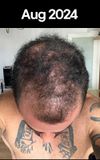community Didn’t think I could avoid my ba(l)d ass genetics – 5 months update!
A user's experience with early balding and their regimen of finasteride, minoxidil, microneedling, vitamin D, and biotin to treat it. Another user asked if the minoxidil had helped with regrowth before they started using it.
